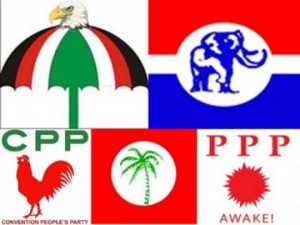IEA announces 2016 pre-election presidential debates
 The Institute of Economic Affairs (IEA) has launched its 2016 debate series for presidential candidates for parties with representation in parliament to articulate their visions and guide voters to make informed choices during the polls.
The Institute of Economic Affairs (IEA) has launched its 2016 debate series for presidential candidates for parties with representation in parliament to articulate their visions and guide voters to make informed choices during the polls.
The debate is expected to provide a unique platform for each presidential aspirant to explain their party’s governance strategy and to clarify how their policies could stir issue-based electioneering and promote peace.
“Indeed, whilst credible elections form an integral part of democracies, political engagement and debates that enable the electorate to make an informed choice on candidates are essential,” Dr Micheal Ofori-Mensah, Senior Research Fellow at IEA, said at the launch.
The IEA’s 2016 pre-election debate which would cover presidential debates and vice presidential debates as was done alongside the ‘2012 debate series publication’ aimed to deepen citizens’ knowledge on the 2012 debate series.
“Democracy is truly exercised when the electorate is knowledgeable and informed. Hence, for the fifth consecutive time, the IEA would host its pre-election debate series for candidates whose parties have representation in parliament,” he said.
Dr Ofori-Mensah said the institute would hold two presidential debates for each party to discuss policies and programmes that they believe would best serve national interests as well as point out policy weaknesses of their co-contestants and offer alternative solutions.
He said the IEA was exploring possibilities of holding an exclusive debate for the two front runners – National Democratic Congress and New Patriotic Party – and a separate one for candidates from minority parties without seats in parliament.
One debate would be organised for vice aspirants whose parties have representation in parliament, Dr Ofori-Mensah said.
He said the objective of the vice presidential debate was same as the presidential one since they would need to assume the position of the president in his or her absence, hence the need for them to also demonstrate the qualities of a president.
Dr Ofori-Mensah said they would organise an evening encounter series between mid-June and mid-July to enable candidates interact with the voters.
The first presidential debate is expected to take place in the last week of September while the second would be in the third week of October with the vice presidential debates likely to happen in the first week of October.
A Presidential Debate Committee would be constituted to review the ground rules that would govern the debates and solicit questions from the populace to evoke accountability, he said.
Political pundits hold that since the success of this year’s presidential and parliamentary polls would mark 24 years of uninterrupted constitutional rule in Ghana it would put the country in a more enviable position among its peers in the sub-region.
Source: GNA
